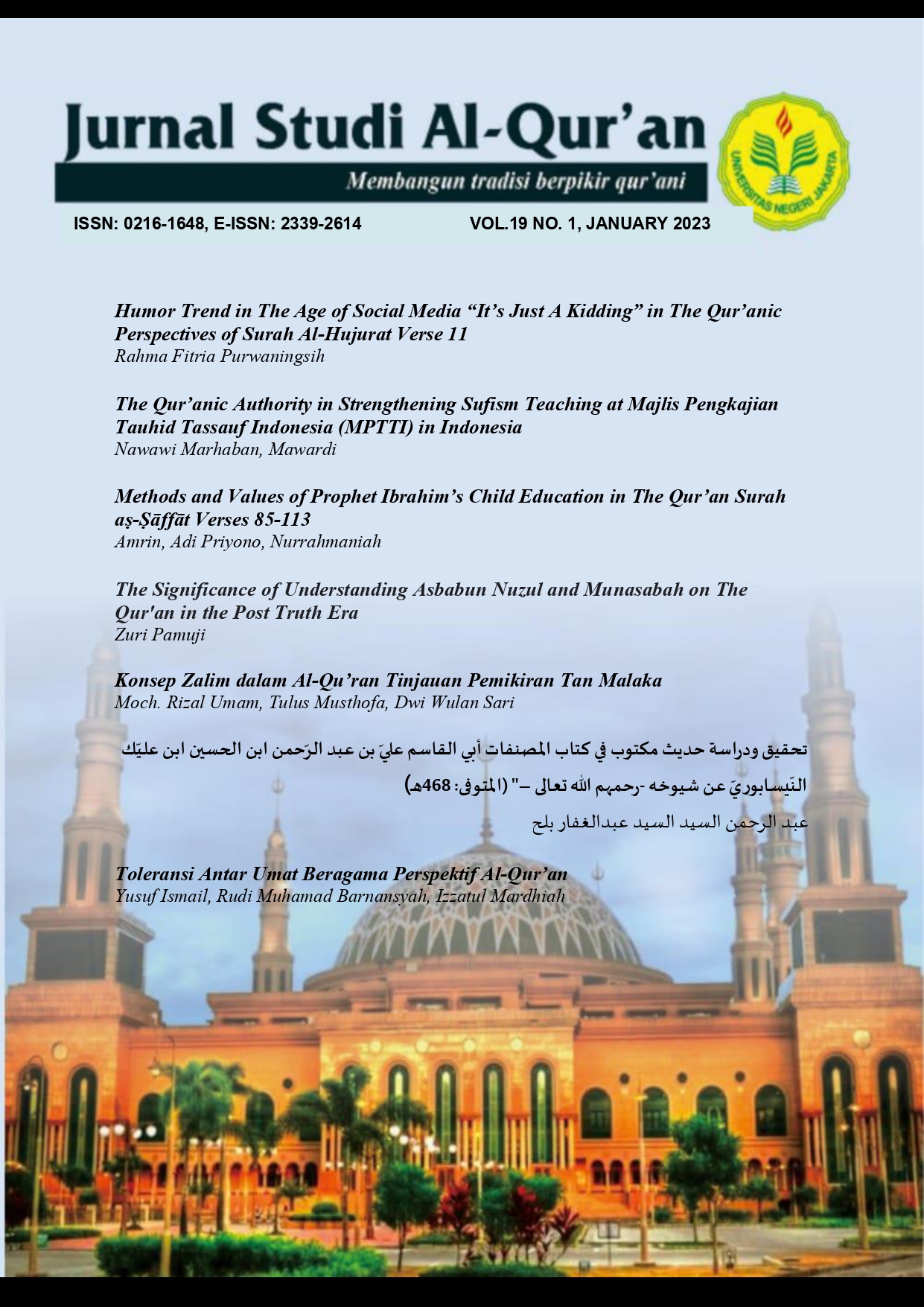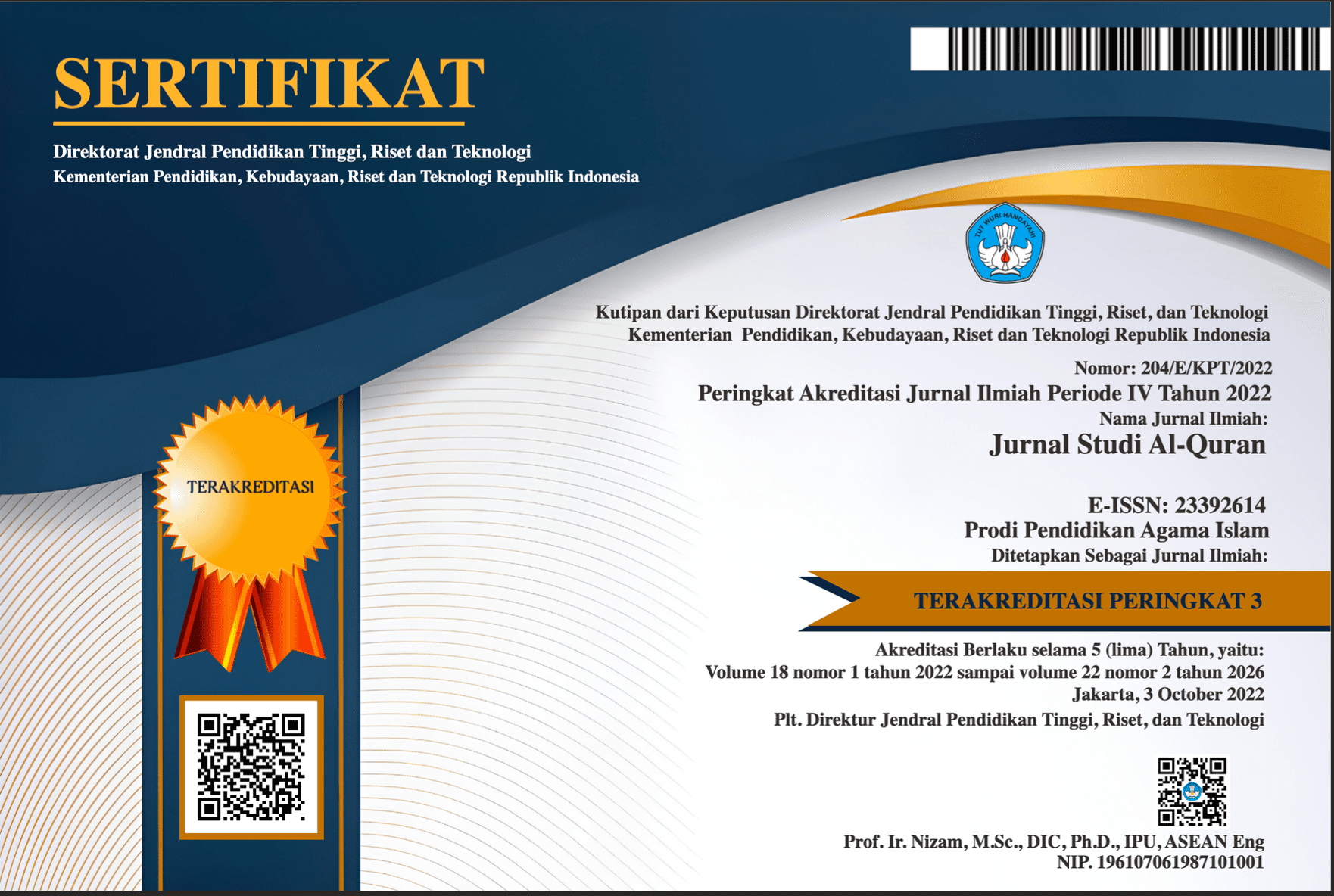Methods and Values of Prophet Ibrahim’s Child Education in The Qur’an Surah aṣ-Ṣāffāt Verses 85-113
DOI:
https://doi.org/10.21009/JSQ.019.1.03Keywords:
Method, Values, Al-Qur'an, Islamic Child Education, Prophet IbrahimAbstract
The impact of globalization causes various kinds of negative behavior and actions in early childhood, causing a degradation of morality and religiosity. The research objective was to determine the concept of Islamic education and the methods and values developed by the Prophet Ibrahim in the education of children in QS aṣ-Ṣāffāt verses 85-113. This study uses a linguistic (philological/semantic) approach regarding the verses of the al-Qur'an Surah Aṣ-Ṣāffāt Verses 85-113, with the type of library research. The primary source in this research is the al-Qur'an surah aṣ-Ṣāffāt verses 85-113, and the secondary sources include the interpretation books, such as: "Tafsir Al-Azhār", Buya Hamka, Tafsir Al-Mishbāh, Quraish Shihab, Al-Qur’an and its Tafseer, and others. The data collection technique uses a library research technique. With the data collection method using documentation method using content analysis (content analysis).The results of the research show that the methods used by Prophet Ibrahim in surah ash-Shaffat verses 85-113 in children education include the tazkiyah method (purification), the method of choosing the environment, the method of having a vision, mission and goals, communication methods, methods of building a spirit of sacrifice to obtain pleasure, love and help of Allah Most High and methods of giving gifts (reward). The values developed by Prophet Ibrahim in surah ash-Shaffat verses 85-113 in children's education include the value of faith, the value of praying, the value of democratic attitudes, the value of patience, the value of tawakal (surrender) and the value of humanization. The concept of Islamic education as a process of a series of activities to humanize humans (humanization), or efforts to help humans to be able to manifest themselves according to their human dignity, based on divine messages with an attitude and personality totality surrendering to Him in all aspects of life to seek pleasure his.
References
Albi, N. S., Hadiyanto, A., Hakam, A., & Wajdi, F. Metode Menghafal Alquran Tawazun dan Peningkatan Self Esteem Santri di Pesantren Daarul Huffadz Indonesia.
Amrin, Adi Priyono, R. P. (2022). Metode Pemahaman Al- Qur’an (Studi Kajian Tafsir Al- Qur’an dengan Pendapat Sahabat). AL FAWATIH Jurnal Kajian Al-Qur’an Dan Hadis, 3(2), 108–129. https://doi.org/https://doi.org/10.24952/al%20fawatih.v3i2.5981
Amrin & Amirullah. (2022). Contemporary Legal Istimbat: Study on the Theory of Changes in Fatwa According to Yusuf Qardhawi. Mizan: Journal of Islamic LawJournal of Islamic Law Studies, 6(1), 89–108. https://doi.org/https://doi.org/10.32507/mizan.v6i1.1244
Amrin Amrin, Muthoifin Muthoifin, Sudarno Shobron, H. R. P. P. (2020). Islamic Values of the Peta Kapanca Tradition at the Mbojo Tribe’s Marriage, West Nusa Tenggara, Indonesia. Cakrawala:Jurnal Studi Islam, 15(2), 15–26. https://doi.org/https://doi.org/10.31603/cakrawala.3405
Amrin dan Juryatina. (2021). Students ’ interest in Arabic language learning : the roles of teacher. Journal of Educational Management and Intruction, 1(1), 40–49.
Armstrong, L., Harding, F., Critchley, J., McNarry, A. F., Myatra, S. N., Cooper, R., & Baker, P. A. (2020). An international survey of airway management education in 61 countries. British Journal of Anaesthesia, 125(1), e54–e60. https://doi.org/10.1016/j.bja.2020.04.051
Asiah, S., Huda, M., Amrin, A., Kharisma, R., Rosyada, D., & Nata, A. (2022). The Dynamics of Islam in Indonesia in the Perspective of Education. Prosiding ICIiS and ICESTIIS, 1–9. https://doi.org/10.4108/eai.20-10-2021.2316321
Az-Zuhaili, W. (2016). Tafsir Al-Wasith (Al-Qhashash-An-Naas) jilid 3.
Bago, J. L., Ouédraogo, M., Akakpo, K., Lompo, M. L., Souratié, W. dite M., & Ouédraogo, E. (2020). Early Childhood Education and Child Development: New Evidence from Ghana. Children and Youth Services Review, 108, 104620. https://doi.org/10.1016/j.childyouth.2019.104620
Biwer, F., Egbrink, M. G. A. oud., Aalten, P., & de Bruin, A. B. H. (2020). Fostering Effective Learning Strategies in Higher Education – A Mixed-Methods Study. Journal of Applied Research in Memory and Cognition, 9(2), 186–203. https://doi.org/10.1016/j.jarmac.2020.03.004
Delaisse, J M; Andersen, TL; Kristensen, HB; Jensen, PR; Andreasen, CM; Søe, K. (2020). Jo ur na of. Bone. https://doi.org/10.1016/j.scitotenv.2020.138028
Department of Religion of the Republic of Indonesia. (2013). Qur’an and Translation, year edition 2002.
Heyden, E., Küchenhof, J., Greve, E., & Krause, D. (2020). Development of a Design Education Platform for an Interdisciplinary Teaching Concept. Procedia CIRP, 91, 553–558. https://doi.org/10.1016/j.procir.2020.02.213
Ibnu Katsir. (2018). Tafsir Ibnu Katsir Jilid 8. Insan Kamil.
Ingutia, R., Rezitis, A. N., & Sumelius, J. (2020). Child poverty, status of rural women and education in sub Saharan Africa. Children and Youth Services Review, 111(February), 104869. https://doi.org/10.1016/j.childyouth.2020.104869
Juraschek, M., Büth, L., Martin, N., Pulst, S., Thiede, S., & Herrmann, C. (2020). Event-based education and innovation in Learning Factories - Concept and evaluation from Hackathon to GameJam. Procedia Manufacturing, 45(2019), 43–48. https://doi.org/10.1016/j.promfg.2020.04.057
Karastoyaiiov, D., Stoiinenov, N., & Gyoshev, S. (2019). Methods and means for education of people with visual impairments. IFAC-PapersOnLine, 52(25), 539–542. https://doi.org/10.1016/j.ifacol.2019.12.601
Kidd, D., Miner, J., Schein, M., Blauw, M., & Allen, D. (2020). Ethics across the curriculum: Detecting and describing emergent trends in ethics edufile. Studies in Educational Evaluation, 67(July), 100914. https://doi.org/10.1016/j.stueduc.2020.100914
LAW OF THE REPUBLIC OF INDONESIA NUMBER 20 YEAR 2003 CONCERNING NATIONAL EDUCATION SYSTEM (Issue 1). (2003). https://doi.org/10.16309/j.cnki.issn.1007-1776.2003.03.004
Masuda, K., & Yudhistira, M. H. (2020). Does education secularize the Islamic population? The effect of years of schooling on religiosity, voting, and pluralism in Indonesia. World Development, 130, 104915. https://doi.org/10.1016/j.worlddev.2020.104915
Mustofa, A., Istikomah, R., & Ma’mun, M. A. (2019). Reward And Punishment In Islamic Education. Istawa: Jurnal Pendidikan Islam, 4(1). https://doi.org/10.24269/ijpi.v4i1.1662
Muthoifin. (2020). Optimizing Teacher Competence Towards Ideal and Quality Educator in Islamic School. Humanities & Social Sciences Reviews, 8(3), 1454–1463.
Nailis, S. A. S. A. M. M. A.-Q. A. I. I. M. U. R. (2022). New Normal and Islamic Education: Islamic Religious Education Strategy On Educational Institutions in Indonesia. Jurnal Pendidikan Dan Konseling, 4(3), 120–129.
Pane, A. (2019). Educational Interactions between Educators and Learners in Islamic Education. Journal of Communication and Social Sciences Development, 3(2), 137–156.
Sabic-El-Rayess, A. (2020). Epistemological shifts in knowledge and education in Islam: A new perspective on the emergence of radicalization amongst Muslims. International Journal of Educational Development, 73(December 2019), 102148. https://doi.org/10.1016/j.ijedudev.2019.102148
Setiawan, D., & Mufarihah, S. (2021). Tawakal Dalam Al-Qur’an Serta Implikasinya Dalam Menghadapi Pandemi Covid-19. Jurnal Studi Al-Qur'an, 17(1), 1-18.
Shihab, M. Q. (2007). A Glimmer of Divine Light: Living With the Qur’an. https://books.google.co.id/books?id=-H3f0LXlFOAC&lpg=PA5&ots=RO-CpzfDDa&lr&hl=id&pg=PA44#v=onepage&q&f=false
Shihab, M. Q. (2009a). Tafsir Al-Mishbah; Message, Impressions and Harmony of the Qur’an, Vol. 12.
Shihab, M. Q. (2009b). Tafsir Al-Mishbah; Message, Impressions and Harmony of the Qur’an, Vol. 7.
Shihab, M. Q. (2009c). Tafsir Al-Mishbah;Message, Impressions and Harmony of the Qur’an, Vol. 2.
Shobron, Amrin, & Rosyadi, Imron, M. (2020). Islamic Education Values in the Tradition of Peta Kapanca of Mbojo Community Tribe in West Nusa Tenggara Department of Islamic Law Universitas Muhammadiyah Surakarta Indonesia Mut122@ums.ac.id. International Journal of Advanced Science and Technology, 29(5), 6802–6812.
Supriyanto, Amrin, A. A. R. (2022). ISLAMIC EDUCATION PARADIGM ( A Case Study at Islamic Boarding School of Al-Muayyad Surakarta ). Akademika : Jurnal Pemikiran Islam, 27(1), 31–46. https://doi.org/10.32332/akademika.v27i1.4562
Supriyanto, Amrin, S. (2022). The Role of Islamic Religious Education Teachers in Implementing Multicultural Education Based on Values of Local Wisdom in State Junior High School 15 Surakarta. IMProvement, 9(1), 65–81. https://doi.org/https://doi.org/10.21009/Improvement.091.07
Supriyanto, A. (2022a). Concepts and Paradigms of Islamic Education in Indonesian Islamic Boarding Schools (Study at Al-Mukmin Ngruki Islamic Boarding School) 1). International Journal Of Humanities Education And Social Sciences (IJHESS), 2(2), 454–468. https://doi.org/https://doi.org/10.55227/ijhess.v2i2.257
Supriyanto, A. (2022b). Curriculum Management and Development of Multicultural Values Based Learning on State Madrasah Tsanawiyah 15 Boyolali. Al-Ishlah: Jurnal Pendidikan, 14(4), 5991–6002. https://doi.org/10.35445/alishlah.v14i4.2201
Supriyanto, A. (2022c). Management of Islamic Religious Education Learning Based on Cooperative Problem E-Learning During The Covid-19 Pandemic (Study on Muhammadiyah High School Sukoharjo, Central Java). Jurnal Pendidikan Dan Konseling, 4(3), 30–36. https://core.ac.uk/download/pdf/322599509.pdf
Supriyanto, A. (2022d). Religion Moderation on Academic Community Islamic Higher Education in Indonesian. Mantik, 6(2), 1859–1868.
Varshney, N., Lee, S., Temple, J. A., & Reynolds, A. J. (2020). Does early childhood education enhance parental school involvement in second grade?: Evidence from midwest child-parent center program. Children and Youth Services Review, 117(April), 105317. https://doi.org/10.1016/j.childyouth.2020.105317
Williams, C. (2007). Research Methods. Journal of Business and Economic Research, 5(3), 65–72.
Yono, Amrin, A. I. I. (2022). Alignment of Local Wisdom Values with Islamic Law in the Tradition of the Peta Kapanca Ceremony. Hayula: Indonesian Journal of Multidisciplinary Islamic Studies, 6(1), 59–80. https://doi.org/https://doi.org/10.21009/hayula.006.02.02
Yusni Khairul Amri, Silvana Sinar, A. S. (2016). DEPRECIATION OF UNDERSTANDING LEXICON IN TRADITIONAL WEDDING CEREMONY IN SOUTH TAPANULI, MEDAN. European Journal of English Language and Literature Studies, 4(3), 49–59. https://doi.org/10.1017/CBO9781107415324.004
Zaidi, S. A. H., Wei, Z., Gedikli, A., Zafar, M. W., Hou, F., & Iftikhar, Y. (2019). The impact of globalization, natural resources abundance, and human capital on financial development: Evidence from thirty-one OECD countries. Resources Policy, 64(June), 101476. https://doi.org/10.1016/j.resourpol.2019.101476
Downloads
Published
How to Cite
Issue
Section
License
Authors who publish with this Journal agree to the following terms:
- Author retain copyright and grant the journal right of first publication with the work simultaneously licensed under a creative commons attribution licensethat allow others to share the work within an acknowledgement of the work’s authorship and initial publication of this journal.
- Authors are able to enter into separate, additional contractual arrangementfor the non-exclusive distribution of the journal’s published version of the work (e.g. acknowledgement of its initial publication in this journal).
- Authors are permitted and encouraged to post their work online(e.g. in institutional repositories or on their websites) prior to and during the submission process, as it can lead to productive exchanges, as well as earlier and greater citation of published works.
Users/public use of this website will be licensed to CC BY










